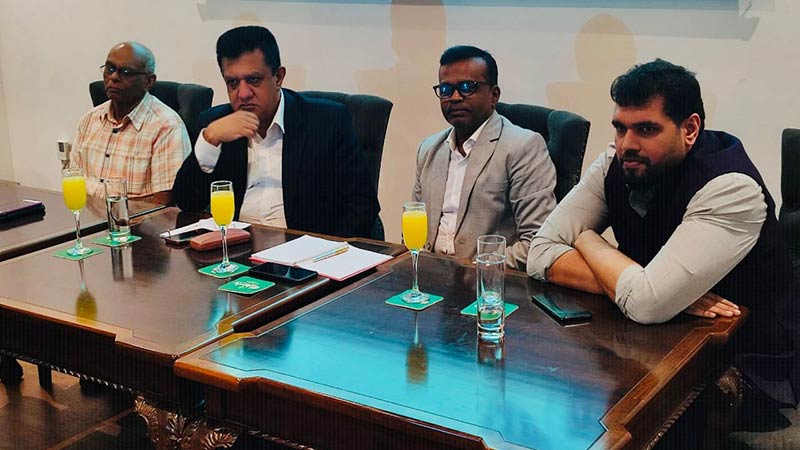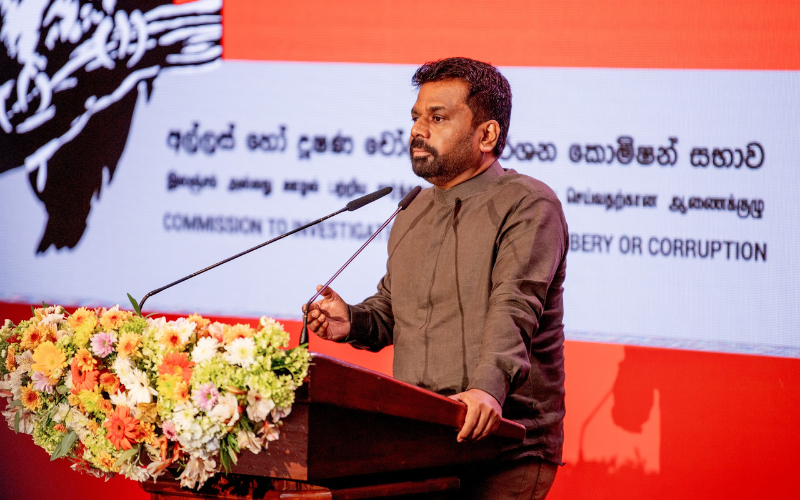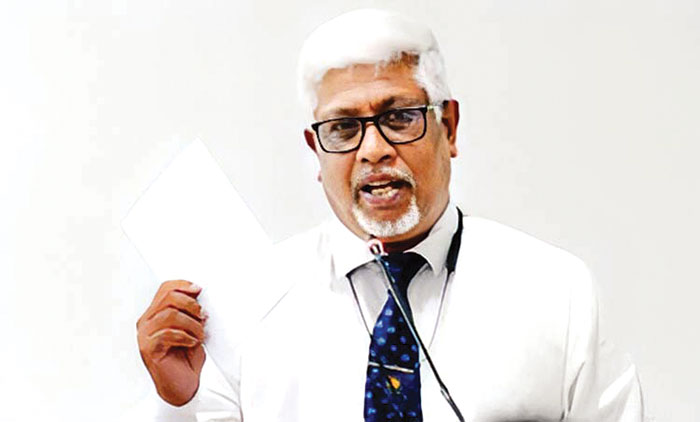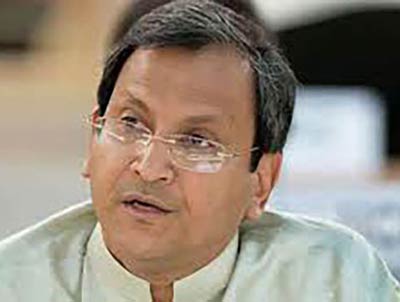News
Former Lankan Foreign Secretary advocates for non-alignment

Ex-CBSL Deputy Governor backs AKD’s ETCA move
By Shamindra Ferdinando
Executive Director of Lakshman Kadirgamar Institute (LKI) Ambassador Ravinatha Aryasinha strongly asserted that Sri Lanka shouldn’t under any circumstances align with the US, China or India.
Aryasinha, who had served as Foreign Secretary during the presidencies of Maithripala Sirisena and Gotabaya Rajapaksa underscored the need not to antagonize any country.
Briefly referring to Sri Lanka’s relations with India and China, the one-time Ambassador in Washington, as well as top envoy in Geneva, emphasized that Sri Lanka couldn’t choose between China and India. “I wouldn’t want to make that choice. I think we need to respect each for their contribution to us,” Ambassador Aryasinha said, warning of far reaching consequences of being aligned with one country.
The LKI chief said so at the conclusion of a discussion on Indo-Lanka relations organized by Nexus Research, backed by One-text Initiative, at the 80 Club recently.
The opening remarks were made by Nexus Chairman, Prof. Charitha Herath, and the two-hour discussion was moderated by Nexus Director, Karunarathna Paranawithana, both former lawmakers.
Ambassador Aryasinha explained his position after former Deputy Governor, CBSL Dr. W.A. Wijewardena, and Executive Director of the Centre for Law and Security, Studies Nilanthan Niruthan, declared their support for alignment with Narendra Modi’s India.
Dr. Wijewardena didn’t mince his words when he declared that Sri Lanka should jump on the bandwagon. Commending President Anura Kumara Dissanayake for resuming talks on the Economic and Technology Cooperation Agreement (ETCA) with New Delhi, the senior economist declared that we couldn’t do without India.
Having briefly dealt with the Indo-Sri Lanka Free Trade Agreement of 1998, talks on Comprehensive Economic Partnership Agreement (CEPA) that had been undertaken during Ranil Wickremesinghe premiership but never materialized, and resumption of talks with India on CEPA, with it been rebranded ETCA, Dr. Wijewardena alleged the UNP leader didn’t have the strength to go ahead with it.
The former CBSL Deputy Governor emphasized that India was so far ahead and further expanding rapidly Sri Lanka should align with them without delay.
Niruthan censured Sri Lanka’s approach towards foreign relations with the focus on what he described as the pathetic failure on the part of successive governments to think and act strategically. Alleging that Sri Lanka pursued policy without really understanding what he called the larger picture.
In support of his argument that Sri Lanka should align with India, Niruthan mentioned Israel as well as Japan and South Korea immensely. Declaring that non-alignment is irrelevant today, Niruthan, throughout his thought-provoking presentation, emphasized the need to go with what he called a strategic swing state.
Attorney-at-Law Shiral Lakthilaka questioned why Sri Lanka, too, couldn’t be a strategic swing state like India. Niruthan explained as to why bankrupt Sri Lanka couldn’t achieve that status.
The Island
sought Niruthan’s opinion on major discrepancy in the joint communique issued following President Dissanayake’s meeting with Premier Modi and the latter’s statement at the joint press conference in respect of the proposed Security Cooperation Agreement (SCA).
While the joint communique proposed that the two governments examine the possibility of concluding a comprehensive framework agreement on defence cooperation, Premier Modi declared that they decided to quickly finalize the proposed SCA. Niruthan opinionated that we should go by the joint communique.
The gathering was also reminded that India couldn’t absolve itself of the responsibility for carrying out a terrorist campaign here in the ’80s.
Commenting on the joint communique issued by China and Sri Lanka following talks between President Jinping and President Dissanayake, Niruthan compared Sri Lanka’s position in 2023 and 2025 in respect to Taiwan. Having previously accepted the One-China policy, the new government had gone a step further by declaring support for all efforts by China to achieve national reunification and opposed Taiwan seeking independence in any form.
In terms of the China-Sri Lanka joint communique, Sri Lanka would have to back Chinese invasion of Taiwan. Declaring that the China-Taiwan conflict is one of the three major issues that dominated the world today, Northam stressed that Sri Lanka, according to the joint communique, had taken a clear stand on the issue involving China.
The two other major issues were the Russia-Ukraine conflict and the Israel war on Gaza, Niruthan said, pointing out Sri Lanka strongly backed Palestine. Therefore, Sri Lanka had taken a clear stand on two of the three major issues and Sri Lanka was on the China-Russia alliance side.
Appreciating growing Indian power at global level, Niruthan explained the strategic swinging state India simultaneously be part of BRICS as well as Quad. According to Niruthan, Sri Lanka’s alignment with India wouldn’t endanger us in the global arena whereas alignment with either the US or China would place us firmly in a block.
Among those who expressed views on Indo-Lanka relations and way forward were Prof. Rohan Samarajeewa, former Minister Dr. Ramesh Pathirana, and ex-State Minister Eran Wickremaratne. Former lawmaker Mrs. Ferial Ashraff was also present.
Niruthan dealt with growing external Indian military action and interventions/rescue operations under Premier Modi’s leadership. During Modi’s rule more operations were carried out, much more than all past governments had done. Although Niruthan gave specific examples of such actions, there was no reference to Indian intervention in Sri Lanka and the Maldives where Indian-trained Sri Lankan terrorists made an abortive attempt to assassinate President Maumoon Abdul Gayoom in Nov, 1988.
Niruthan also discussed the Indian nuclear capabilities while comparing them with other world powers, including members of the Security Council. Special mention was made of the Indian nuclear triad (capability to strike back in spite of being attacked with nuclear weapons. Unlike the UK, India could act on its own in case of a nuclear situation, Niruthan declared, while underscoring how Sri Lanka could benefit immensely from a permanent partnership with India.
Ambassador Aryasinha stressed the pivotal importance of Chinese support during Sri Lanka’s war against the LTTE that was brought to a successful conclusion while Dr. Wijewardena pointed out problems experienced when procuring armaments from China, particularly due to payment issues.
China and Pakistan steadfastly backed Sri Lanka’s war against separatist terrorism.
Latest News
Enforcing the law against bribery and corruption is not an act of political revenge but a profound human responsibility – President

President Anura Kumara Disanayake emphasized that since assuming office, the current government has taken decisive steps to free the process of combating bribery and corruption from political interference. He reiterated that while the political mechanism has been liberated from engaging in such crimes, it is now the responsibility of the administrative machinery operating beneath that political structure to fall in line and correct its course without delay.
He explained that a grace period of six months has already been provided for the state officials to adjust to this new direction. The President firmly warned that if the public service mechanism fails to act appropriately within this period, the government will not hesitate to take firm legal action against those officials from May onwards.
President Disanayake expressed these views on Wednesday (09), participating in the launch of the National Anti-Corruption Action Plan 2025–2029, held at the Bandaranaike Memorial International Conference Hall (BMICH) in Colombo.
Bribery and corruption have proliferated, undermining the integrity and values of the country’s state institutions .He observed that over the past six months of the present government, no section of the public service has been allowed to collapse and that if officials continue to resist change, the government will proceed to remove and replace them after May.
The President pointed out that bribery and corruption have caused the nation to fall behind for decades in the eyes of the world. He reiterated that enforcing the law against these crimes is not an act of political revenge but a profound human responsibility.
The President stressed the need to build a society that respects the law and fears wrongdoing, adding that conducting lectures or workshops alone would not suffice in achieving this goal. He emphasised that people must practically witness that any person who commits a crime will be subjected to punishment under the law.
President Disanayake noted that corruption in Sri Lanka ranges from minor bribery, from the village level to bringing poor quality medicinal drugs. Bribery and corruption have escalated from minor instances to grave financial crimes, extending from local councils to looting the Central Bank.
The President further said that previous rulers safeguarded and protected those engaged in corrupt activities.
He also revealed the emergence of a network of thieves within several state administrative institutions and certain bodies responsible for enforcing the law, comprising underworld elements involved in bribery and corruption. He confirmed that these criminal networks have already been identified and assured that measures will be implemented in the future to dismantle and eliminate them.
President Disanayake solemnly pledged that the responsibility of eradicating bribery and corruption will not be passed on to the next generation but will be resolved within this generation itself, under the leadership of the present government.
Drawing a comparison with India, which gained independence a year before Sri Lanka, the President noted that through a consistent national policy framework, India has successfully achieved space exploration and built a massive workforce in the software industry. In stark contrast, he pointed out that Sri Lanka, due to poor decisions made by its political leadership, was declared a bankrupt state in 2022.
He further stated that the current government has taken on the responsibility of leading Sri Lanka towards the international stage through a national policy framework that ensures transparency and accountability for every rupee spent from public funds.
The President added that by implementing this framework, it is possible to build public trust in law enforcement and judicial institutions and that it must be made clear to the people that there will be no mechanism available for anyone to escape the law after committing a crime.
He stated that the purpose of the National Anti-Corruption Action Plan 2025-2029 is to guide the country towards becoming a nation of integrity. The government plans to establish Internal Affairs Unit within all state institutions including the Presidential Secretariat and implement a system for monitoring these units through digital technology to ensure accountability and transparency.
The Action Plan has been designed around four key strategic priority areas: prevention and public participation, institutional strengthening and the enforcement of law along with reforms in law and policy.
The President highlighted that eliminating bribery and corruption is one of the most decisive factors in a country’s development and progress. In Sri Lanka, the Commission to Investigate Allegations of Bribery or Corruption (CIABOC) has been identified as the leading state institution entrusted with strengthening this mechanism. Accordingly, it was recognised that a robust national anti-corruption policy that operates across all sectors is essential to creating a corruption-free society.
In preparing this Action Plan, CIABOC engaged all relevant stakeholders by conducting extensive programmes at both national and provincial levels. A broad public consultation process was carried out, including a comprehensive survey to assess public opinion on corruption through media announcements in all three languages and via social media networks.
This process gathered proposals from a diverse range of participants, including Members of Parliament, judges, state officials, the private sector, international organisations, civil society organisations, community-based organisations, religious groups, persons with special needs, media professionals, youth, children and the general public. Additionally, foreign state experiences and suggestions from various groups across all provinces were taken into consideration when formulating the Action Plan.
By implementing this National Anti-Corruption Action Plan, the government hopes to foster a committed citizenry determined to combat corruption, a political will fully supportive of this effort, a comprehensive legal framework and a disciplined, transparent public service across all sectors, with the shared vision of building a country of integrity for future generations.
Addressing the event, the Japanese Ambassador to Sri Lanka, Hideaki Mizukoshi, stated that Corruption remains a great challenge for many countries, including Sri Lanka as it undermines economic growth, weakens public trust in government institutions and discourages foreign investment. However, he noted that due to the reform initiatives of the present government, investors are once again showing increasing interest in Sri Lanka.
Ambassador Mizukoshi further stated that Japan has always believed that transparency and good governance are fundamental pillars for sustainable economic development and therefore, has supported anti-corruption initiatives globally for over a decade.
Meanwhile, the UNDP Resident Representative in Sri Lanka, Ms. Azusa Kubota, stated that according to Sri Lanka’s first-ever National Taxpayer Perception Survey conducted last year, 84% of respondents indicated that corruption directly affects their willingness to pay taxes.
She further noted that corruption deters investment, increases the cost of doing business, undermines sustainable development and human security, and causes an estimated annual loss of USD 1.3 trillion for developing countries.
Referring to the Budget Speech delivered by the President, Ms. Kubota emphasised that the State must be accountable for every cent of taxpayers’ money and stated that this Action Plan would serve as a roadmap for transforming Sri Lankan society.
The event was attended by the Chief Justice, Supreme Court Justice Murdu Nirupa Bidushinie Fernando; the Attorney General, Parinda Ranasinghe PC; the Secretary to the President, Dr. Nandika Sanath Kumanayake; the Chairman of CIABOC, former High Court Judge Neil Iddawela; the Director General of CIABOC, R.S.A. Dissanayake; the Commanders of the Tri-Forces; the Inspector General of Police; senior officials from the security forces and a large number of state officials.
Latest News
Sun directly overhead Hatthikuchchi, Kalankuttiya, Halmillewa, Ipalogama, Palugaswewa and Habarana at about 12:11 noon. today [10]

On the apparent northward relative motion of the sun, it is going to be directly over the latitudes of Sri Lanka during 05th to 14th of April in this year.
The nearest areas of Sri Lanka over which the sun is overhead today (10th) are Hatthikuchchi, Kalankuttiya, Halmillewa, Ipalogama, Palugaswewa and Habarana at about 12:11 noon.
News
LG elections to be staggered

Signs are clear that the local government (LG) elections, originally scheduled for 06 May, will have to be held on a staggered basis, as nomination lists in respect of about 200 out of 339 LG institutions have been challenged before the Court of Appeal, according to sources.
Those who have filed cases in the Court of Appeal seek writs against holding the elections. The final date for filing cases is 21 April.
By yesterday only 113, out of 339 local government bodies, had been cleared for the 06 May elections, with no rejections of nomination lists, or objections, sources said. The nomination lists for 226 local government bodies have been rejected, and candidates on these rejected lists are entitled to file cases against the Election Commission (EC) until 21 April.
The Court of Appeal (CA) has ordered that some of the lists rejected by the Election Commission be accepted. However, the EC is planning to challenge all CA orders before the Supreme Court.
When contacted for comment, Director General of the Election Commission, Saman Sri Ratnayake, told The Island that all arrangements had been made to hold the elections on 06 May, in accordance with the provisions of the Local Authorities Elections (Amendment) Act No. 16 of 2017.
“We will hold elections to the local government bodies for which there are no legal barriers, and this will depend on the final decision of the courts,” Ratnayake said, adding that elections to other local government bodies would be held on later dates.
By Saman Indrajith
-

 Business4 days ago
Business4 days agoColombo Coffee wins coveted management awards
-

 Business6 days ago
Business6 days agoDaraz Sri Lanka ushers in the New Year with 4.4 Avurudu Wasi Pro Max – Sri Lanka’s biggest online Avurudu sale
-

 Features5 days ago
Features5 days agoStarlink in the Global South
-

 Business7 days ago
Business7 days agoStrengthening SDG integration into provincial planning and development process
-

 Business6 days ago
Business6 days agoNew SL Sovereign Bonds win foreign investor confidence
-

 Features2 days ago
Features2 days agoSri Lanka’s Foreign Policy amid Geopolitical Transformations: 1990-2024 – Part III
-

 Features5 days ago
Features5 days agoModi’s Sri Lanka Sojourn
-

 Midweek Review2 days ago
Midweek Review2 days agoInequality is killing the Middle Class












